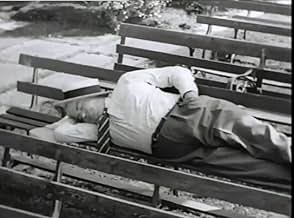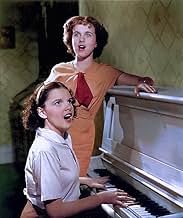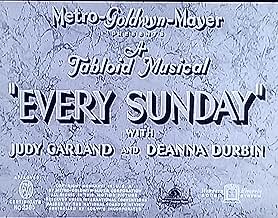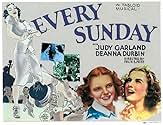Two teenage girls lend their fantastic singing voices to the cause when the city council threatens to replace the orchestra led by one girl's grandfather as the regular entertainment at the ... Read allTwo teenage girls lend their fantastic singing voices to the cause when the city council threatens to replace the orchestra led by one girl's grandfather as the regular entertainment at the Sunday concert-in-the-park series.Two teenage girls lend their fantastic singing voices to the cause when the city council threatens to replace the orchestra led by one girl's grandfather as the regular entertainment at the Sunday concert-in-the-park series.
Clem Bevans
- Man playing checkers
- (uncredited)
Jules Cowles
- Man in Audience
- (uncredited)
Paul Irving
- Mr. Bixby
- (uncredited)
Wright Kramer
- The Professor
- (uncredited)
Thomas Pogue
- Mr. Barfogle
- (uncredited)
Richard Powell
- Pop, Judy's Father
- (uncredited)
Kathryn Sheldon
- Woman Gotten out of Bath
- (uncredited)
Tammany Young
- Man Sleeping on Bench
- (uncredited)
- Director
- Writer
- All cast & crew
- Production, box office & more at IMDbPro
Featured reviews
Although little more than a pleasant 11-minute musical diversion (it's rightly billed as a "Tabloid Musical") EVERY Sunday is one of the most famous and precious documents in cinematic history, since it provides an invaluable look at the burgeoning talents of two of the screen's most talented and beloved musical performers: Deanna Durbin and Judy Garland.
Although often cited as an screen test of sorts, produced by MGM to test the adolescent appeal of studio contractees Durbin and Garland whose options were reportedly coming up for renewal, this assertion is not entirely accurate. By the time EVERY Sunday was produced in July, 1936, Deanna Durbin's contract with MGM had already lapsed and she had been immediately signed by Universal a month earlier, in June 1936.
However, a provision in Durbin's MGM contract permitted the studio to exercise an option on her services for up to sixty days, providing she had not yet begun work on a picture at her new studio. As Durbin's debut vehicle, THREE SMART GIRLS, was still not ready to begin filming, MGM chose to exercise its' option and, although officially under contract to Universal at the time, Durbin found herself back on the MGM lot filming this agreeable short subject with fellow adolescent singing hopeful, Judy Garland.
This, along with Garland's far more extensive prior professional performing experience/training (which included appearances in several earlier movie shorts), may explain why EVERY Sunday often seems to favor Judy Garland over Deanna Durbin, giving Garland more lines to speak and an original song ("Americana") to sing, while Durbin offers the popular classical art song, "Il Bacio" by Luigi Ardiiti. Certainly, it would make perfect sense that MGM would want to favor one of its' own contract players over another from a rival studio.
Ironically, although Garland's character is the more overtly pro-active one of the two girls in this short, it would be Durbin's feisty and impulsive "Little Miss Fixit" screen persona at Universal which would propel her to instantaneous worldwide super stardom as the world's first "Teen Idol" with her debut vehicle, THREE SMART GIRLS, while Garland's more passive "wistful wallflower" adolescent image would see her generally cast in supporting roles opposite frequent screen partner Mickey Rooney and (in ZIEGFELD GIRL) the up-and-coming Lana Turner. Not until her fifteenth MGM feature, 1942' FOR ME AND MY GAL (which was also her first fully "adult" role) would Garland achieve the solo above-the title billing and "solo attraction" status of a true superstar that Durbin had attained instantaneously six years earlier.
It is entirely inaccurate, therefore, to assert that Garland was the only "superstar" attraction of the two girls, as Durbin attained this status with press 'n public, almost a decade before her MGM rival. Literally in foreclosure at the time of her signing, the on screen evidence strongly suggests that Universal was much quicker to realize Deanna's full superstar potential than MGM was with Judy, and it's worth noting that almost every notable accomplishment Garland achieved at MGM, from superstar billing, to having starring vehicles specially written to showcase her talents and appeal, to being invited to plant her footprints in the forecourt of Graumann's Chinese Theater, to receiving an "Honorary" Oscar" in recognition for her talent, Deanna Durbin received well before her gifted MGM contemporary.
In any case, EVERY Sunday is a delightful, utterly unpretentious musical short. Its plot line (Durbin and Garland use their singing talents to save Durbin's grandfather from being forcibly retired by the town council from conducting his Sunday concerts in the park), presages the plot lines of both Garland's "Let's Put On a Show" musicals with Mickey Rooney and Durbin's 100 MEN AND A GIRL. Unlike Garland's later BABES films, the short never treats the insubstantial storyline seriously, and consequently, its' eleven minute running time flies by.
Of course, the true magic of EVERY Sunday is in observing the already remarkable performing talents/screen presences of Durbin and Garland at the very beginning of their legendary careers. Both girls, even at this early stage, possessed remarkable screen presences and are utterly natural and unaffected in their presentation as both singers and actresses. Garland fairly explodes off the screen with vitality as she literally punches out the lyrics to the jaunty "Americana." As she socks across the number with appropriate hand gestures, acting it as well as singing it, as she interacts with members of the park "orchestra."
By contrast, Durbin's presentation of "Il Bacio," is far more demure and subdued. Although entirely appropriate for her "classical" selection, Durbin's delivery of Arditi's waltz is much more of the traditional "stand 'n sing" variety than Garland's physically emotive turn. Nevertheless, though "miniature diva" Deanna does nothing to call attention to herself, with her candid eyes, dazzling smile and artless delivery, she easily holds the screen with "jazz baby" Judy, and their delightful duetting of "Americana" in the short's finale makes one regret all the more that producer Joe Pasternak was never able to realize his dream of pairing Durbin and Garland in a musical feature film (because Universal refused to loan "Number One Asset" Durbin out).
A priceless document of the nascent talents of two remarkable and utterly unique talents. See this one if you get a chance!
Although often cited as an screen test of sorts, produced by MGM to test the adolescent appeal of studio contractees Durbin and Garland whose options were reportedly coming up for renewal, this assertion is not entirely accurate. By the time EVERY Sunday was produced in July, 1936, Deanna Durbin's contract with MGM had already lapsed and she had been immediately signed by Universal a month earlier, in June 1936.
However, a provision in Durbin's MGM contract permitted the studio to exercise an option on her services for up to sixty days, providing she had not yet begun work on a picture at her new studio. As Durbin's debut vehicle, THREE SMART GIRLS, was still not ready to begin filming, MGM chose to exercise its' option and, although officially under contract to Universal at the time, Durbin found herself back on the MGM lot filming this agreeable short subject with fellow adolescent singing hopeful, Judy Garland.
This, along with Garland's far more extensive prior professional performing experience/training (which included appearances in several earlier movie shorts), may explain why EVERY Sunday often seems to favor Judy Garland over Deanna Durbin, giving Garland more lines to speak and an original song ("Americana") to sing, while Durbin offers the popular classical art song, "Il Bacio" by Luigi Ardiiti. Certainly, it would make perfect sense that MGM would want to favor one of its' own contract players over another from a rival studio.
Ironically, although Garland's character is the more overtly pro-active one of the two girls in this short, it would be Durbin's feisty and impulsive "Little Miss Fixit" screen persona at Universal which would propel her to instantaneous worldwide super stardom as the world's first "Teen Idol" with her debut vehicle, THREE SMART GIRLS, while Garland's more passive "wistful wallflower" adolescent image would see her generally cast in supporting roles opposite frequent screen partner Mickey Rooney and (in ZIEGFELD GIRL) the up-and-coming Lana Turner. Not until her fifteenth MGM feature, 1942' FOR ME AND MY GAL (which was also her first fully "adult" role) would Garland achieve the solo above-the title billing and "solo attraction" status of a true superstar that Durbin had attained instantaneously six years earlier.
It is entirely inaccurate, therefore, to assert that Garland was the only "superstar" attraction of the two girls, as Durbin attained this status with press 'n public, almost a decade before her MGM rival. Literally in foreclosure at the time of her signing, the on screen evidence strongly suggests that Universal was much quicker to realize Deanna's full superstar potential than MGM was with Judy, and it's worth noting that almost every notable accomplishment Garland achieved at MGM, from superstar billing, to having starring vehicles specially written to showcase her talents and appeal, to being invited to plant her footprints in the forecourt of Graumann's Chinese Theater, to receiving an "Honorary" Oscar" in recognition for her talent, Deanna Durbin received well before her gifted MGM contemporary.
In any case, EVERY Sunday is a delightful, utterly unpretentious musical short. Its plot line (Durbin and Garland use their singing talents to save Durbin's grandfather from being forcibly retired by the town council from conducting his Sunday concerts in the park), presages the plot lines of both Garland's "Let's Put On a Show" musicals with Mickey Rooney and Durbin's 100 MEN AND A GIRL. Unlike Garland's later BABES films, the short never treats the insubstantial storyline seriously, and consequently, its' eleven minute running time flies by.
Of course, the true magic of EVERY Sunday is in observing the already remarkable performing talents/screen presences of Durbin and Garland at the very beginning of their legendary careers. Both girls, even at this early stage, possessed remarkable screen presences and are utterly natural and unaffected in their presentation as both singers and actresses. Garland fairly explodes off the screen with vitality as she literally punches out the lyrics to the jaunty "Americana." As she socks across the number with appropriate hand gestures, acting it as well as singing it, as she interacts with members of the park "orchestra."
By contrast, Durbin's presentation of "Il Bacio," is far more demure and subdued. Although entirely appropriate for her "classical" selection, Durbin's delivery of Arditi's waltz is much more of the traditional "stand 'n sing" variety than Garland's physically emotive turn. Nevertheless, though "miniature diva" Deanna does nothing to call attention to herself, with her candid eyes, dazzling smile and artless delivery, she easily holds the screen with "jazz baby" Judy, and their delightful duetting of "Americana" in the short's finale makes one regret all the more that producer Joe Pasternak was never able to realize his dream of pairing Durbin and Garland in a musical feature film (because Universal refused to loan "Number One Asset" Durbin out).
A priceless document of the nascent talents of two remarkable and utterly unique talents. See this one if you get a chance!
Every Sunday is an eleven minute short subject featuring the talents of two of its young juvenile contract players, a pair who would develop into players of note in the future. It's interesting and entertaining to see the contrasting styles of Judy Garland and Deanna Durbin as they perform at a Sunday concert for Deanna's uncle.
Of course no one knew how big both of these young ladies would get to be. I've always wondered why Mayer kept Garland and let Durbin go to Universal. L.B. always had pretensions to culture and this was the guy who had Jeanette MacDonald at his studio and later on hired such lovely soprano voices as Jane Powell, Ann Blyth, Doretta Morrow, etc.
Judy certainly had her glorious career at MGM, but she paid a heavy price for it. Deanna, along with Abbott&Costello and several Gothic horror monsters preserved Universal pictures. She was smart enough to get out at the top and make it stick.
So, in their salad days, Deanna Durbin and Judy Garland.
Of course no one knew how big both of these young ladies would get to be. I've always wondered why Mayer kept Garland and let Durbin go to Universal. L.B. always had pretensions to culture and this was the guy who had Jeanette MacDonald at his studio and later on hired such lovely soprano voices as Jane Powell, Ann Blyth, Doretta Morrow, etc.
Judy certainly had her glorious career at MGM, but she paid a heavy price for it. Deanna, along with Abbott&Costello and several Gothic horror monsters preserved Universal pictures. She was smart enough to get out at the top and make it stick.
So, in their salad days, Deanna Durbin and Judy Garland.
We are very fortunate to have such historic pieces of film preserved. Deanna and Judy captured on film at the very beginning of their individual spectacular careers. Two diverse voices blended in a brief eleven minutes. Many other ledgendary performers were filmed at the outset of sound, and these may be the only records in existance of their performances. Living history.
8tavm
Having previously seen this short on VHS tape with the feature Summer Stock, I just rewatched Every Sunday on the TCM site. It marked the film debut of 15-year-old Deanna Durbin and of 14-year-old Judy Garland outside of her two older sisters. These two teens showcase their musical talents with a solo from Deanna of "Il Bacio", then one from Judy of "Waltz with a Swing" before the two climax with "Americana". The slight plot of this 11-minute film concerns the possible unemployment of Edna's (Durbin's real first name which is the way she's addressed here) grandfather's conducting job at the park because of low attendance. With the two girls' help, you can probably guess what happens from there! Contrasts are marked not only with Garland's and Durbin's musical choice but also with their height, poise, and movement. Despite all that, they perform quite well at the end and it's almost surprising that M-G-M chose Garland while Durbin was already contracted at Universal as this short was made but was briefly allowed back in since her feature debut (Three Smart Girls) was in the early preparing stages. Judy herself would make her first feature (Pigskin Parade) at 20th Century-Fox as M-G-M was deciding what movie she would next star in. That would be Broadway Melody of 1938 where she would perform the show stopping number, "Dear Mr. Gable (You Made Me Love You)". But back to this short, Every Sunday provides a warm and wonderful glimpse of two star singers at the beginning of their legendary careers unaware of what the future holds for them...
Every Sunday was basically made as a screen test for MGM execs to choose which prodigy they wanted to contract. Obviously, they chose Garland, and Durbin went on to great success for Universal in "Three Smart Girls".
I love this short film, and although it has no plot, it is interesting to observe the dueling divas sing their hearts out.
I love this short film, and although it has no plot, it is interesting to observe the dueling divas sing their hearts out.
Did you know
- TriviaThis film was not (as is often reported) a "screen test" of sorts produced by MGM to help the studio decide which of these two girls, Deanna Durbin or Judy Garland, to keep under contract. Durbin was released by MGM and signed by Universal prior to this movie's production. A blurb on 1 June 1936 in "The Hollywood Reporter" stated "Universal had changed Canadian-born Edna Mae Durbin's name to 'Dianna' [sic]." This movie, it appears, was not produced until at least July 1936, by which time Durbin had already been signed by Universal and cast in her debut vehicle, Trois jeunes filles à la page (1936). The reason she appeared in this film was reportedly due to a provision in her MGM contract which entitled the studio to request her services for up to 60 days following its termination, provided she was not already shooting a film at her new studio. As filming on "Three Smart Girls" was not scheduled to begin until September 1936, Durbin found herself back at MGM making this short with Garland. This is why, although her on-screen character is called "Edna" in the short (Deanna's real name), in the credits she is billed under the name by which she would soon become internationally famous, "Deanna".
- GoofsWhen the girls are singing, their mouths do not always match the soundtrack.
- ConnectionsFeatured in Il était une fois Hollywood (1974)
Details
- Release date
- Country of origin
- Language
- Also known as
- Каждое воскресенье
- Filming locations
- Production company
- See more company credits at IMDbPro
- Runtime
- 11m
- Color
- Aspect ratio
- 1.37 : 1
Contribute to this page
Suggest an edit or add missing content




























